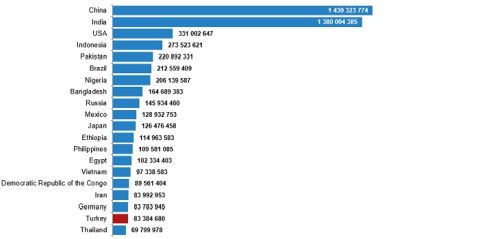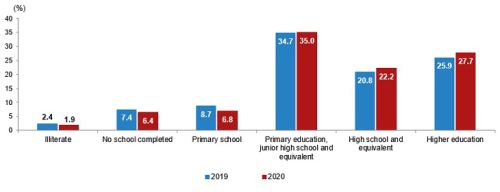AHEAD OF WORLD POPULATION DAY
‘Turkey is the 19th most populous country of the world’

* Photo: Anadolu Agency (AA) / Taksim, İstanbul
In light of the upcoming World Population Day on July 11, the Turkish Statistical Institute (TurkStat) has released a statistic according to this year's theme: the prioritization of reproductive health and rights.
With this year's decision on the theme, the United Nations Population Fund (UNFPA) wants to raise awareness about gender inequalities that have been on the rise since the outbreak of the COVID-19 pandemic - the stated biggest global health problem of the century.
Attention is drawn to countries where health services are specially aggravated, leaving women deprived of healthcare services and family planning methods and most frequently comes along with increased risk of child marriage and domestic and sexual violence.
As a solution to changing fertility rates, UNFPA argues that priority needs to be given to reproductive health and human rights. For sustainable improvement, policy makers need to understand the current conditions.
Against this backdrop, the TurkStat's press release constitutes "the first and most important step that can be taken" for improvement by providing precise up-to-date statistics of the global situation of women and girls.
Turkey constitutes 1.1 percent of world population
According to the UN, in 2021, the world population is estimated to be approximately 7 billion 794 million 798 thousand 729 people. Closely followed by India with 1 approximately 1 billion 380 people, China has the highest population size with 1 billion 439 million people.
With a population of 83 million 384 thousand 689, Turkey ranks 19th after Germany. This number constitutes 1.1 percent of the world population.

* Top 20 countries with the highest population, 2020 (Source: United Nations World Population Prospects, 2019. The source of Turkey's data is TurkStat.)
Following the European trend, the number of life births decreased from 1 million 186 thousand 560 in 2019 to 1 million 112 thousand 859.
TurkStat records the trend of a shrinking fertility rate from 2.38 children in 2001 to 1.76 children in this last year, with the highest rate being counted in Urfa (3.71) and the lowest in Karabük (1.29).
This leaves Turkey between the average global fertility rate of 2.4 and the total fertility rate of 1.53 in the European Union (EU).
Compared to the early 1970's, when women had an average of 4.5 children, this data shows enormous changes in the development.
Statistics further show the elevation of women in Turkey giving a first birth at the age of 29, which aligns with the EU increase to 29,3 years.
Some data draw a positive picture
Looking at the increasing education level of mothers as well as the adolescent fertility rate and the decrease of legal child marriages in Turkey (though still at 2.7 percent) a rather positive development can be noted.

* Mother's educational level, 2019, 2020
Further, the TurkStat statistics have shown that the mean age at first marriage for women has increased from 24.4 in 2015 to 25.1 in 2020.
According to the TurkStat, "the age at first marriage has a major impact on childbearing" on the grounds that "women who marry early will have, on average, a longer period of exposure to pregnancy, which in turn often leads to a higher number of lifetime births."
According to the UN data, the expected world trend shows a population increase to 10.9 billion in 2100. While already today not more than 55 percent of women worldwide can make their own decisions about their bodies, these numbers suggest the risk of increase.
The world population day means to shed light on the effects of overpopulation amplifying health problems of women and girls as a more vulnerable part of society. This recalls the fortified need for family planning, gender equality, and maternal health in the future. (BB/SD)



